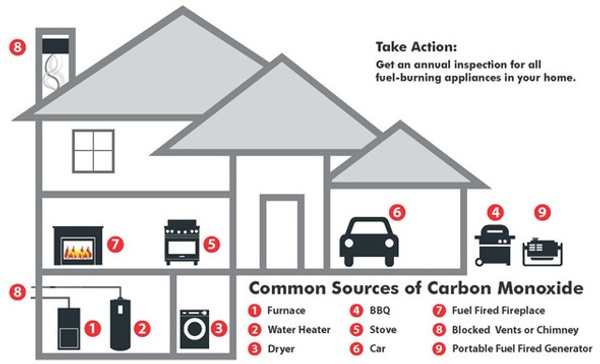The risk of a build up of dangerous levels of carbon monoxide (CO) in homes and businesses increases significantly during the heating season. UGI urges customers to take several simple steps to remain safe in colder weather.
CO poisoning is serious and can be fatal. Individuals who think they might be experiencing symptoms of CO poisoning should immediately seek fresh air and prompt medical attention.
CO can be caused by malfunctioning heating systems or appliances as well as damaged or blocked vents and chimneys. CO is a colorless, odorless, poisonous gas that is a by-product of the incomplete combustion of fuels such as wood, charcoal, gasoline, kerosene, oil, natural gas, and propane.
Symptoms of CO poisoning include flu-like symptoms such as headache, nausea, and dizziness, as well as fatigue and shortness of breath.
Signs there may be a build-up of CO in your home include:
- Significant condensation on walls and windows;
- House pets becoming sluggish;
- Residents in the home suffering flu-like symptoms or feeling unusually tired;
- Chronic odors from a malfunctioning appliance. While CO is odorless, the malfunctioning appliance can emit a sooty or smoky smell.
Residents can take a number of steps to help ensure their safety, including the following:
- Make sure working smoke and carbon monoxide detectors are appropriately located within living spaces and the batteries powering them are fresh. CO detectors/alarms should be located on each floor of a home, including one in each bedroom or sleeping area. Note that CO detectors have a limited operating life. Check the manufacturer’s instructions for related information and replacement considerations.
- In the case of winter weather, clear any accumulation of snow or ice from the outside vents of your appliances. This allows the air flow necessary for safe appliance operation. Blocked vents can lead to a dangerous build-up of carbon monoxide inside your home.
- If your heating system has not been serviced recently, have a qualified professional check your furnace, water heater, and other internal combustion appliances. An annual check and service of your heating system and appliances will help ensure the safe operation of your equipment.
- Check the connections to your chimney or flue for damage or corrosion. In addition, check for black stains visible on the outside of your chimney or flue. These stains can indicate a blockage. A damaged or blocked chimney could allow exhaust gas, including CO, to enter your home or workplace. Contact a heating professional to have your chimney and flue checked.
- Change or clean furnace filters regularly. Clogged filters can reduce the efficiency of your heating equipment and impede normal operations. Also make sure the filter you use is the proper size and shape for your system.
If the heating equipment in your home or business is not working because of an electric power outage, never use an open oven or grill inside your home to provide heat.
Use caution when using unvented space heaters, which can be a source of CO. Always follow manufacturer’s directions regarding the use of these heaters. Unvented heaters are designed for supplemental use only. Be sure to provide adequate ventilation in areas where a space heater is used. Do not use unvented heaters in bedrooms, bathrooms, or confined spaces.
UGI Utilities, Inc. is a natural gas and electric utility serving more than 740,000 customers in 45 Pennsylvania counties and one county in Maryland. Customers interested in additional information should visit the UGI website at www.ugi.com; on Facebook at www.facebook.com/ugiutilities; or on Twitter at www.twitter.com/ugi_utilities.

